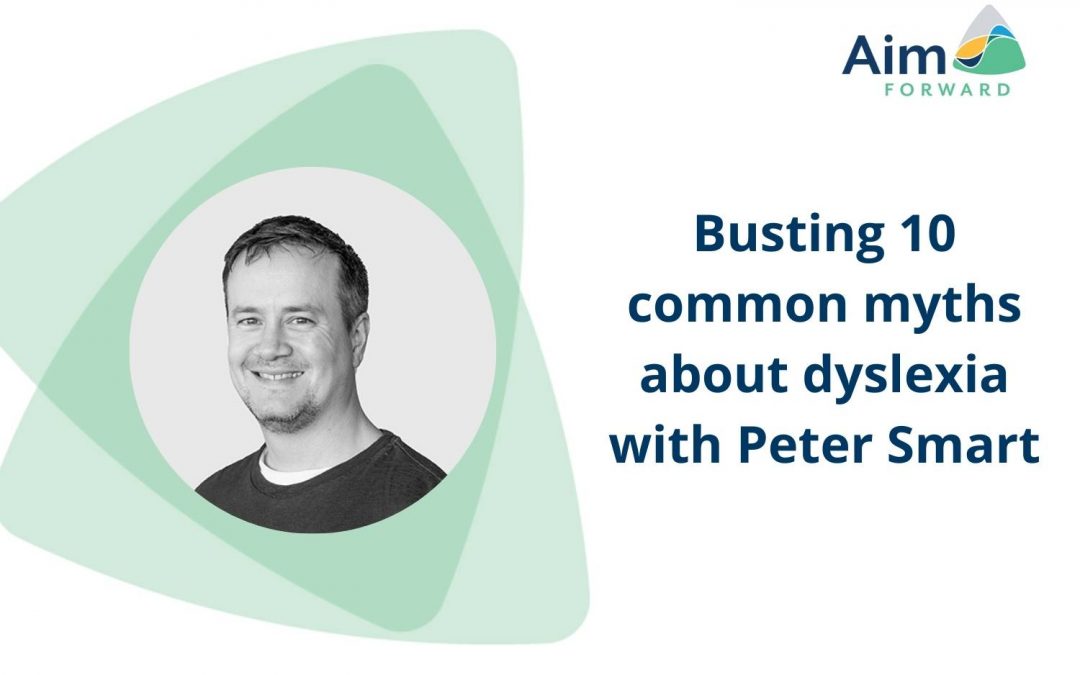We asked one of our Aim Forward Needs Assessors, Peter Smart, to share his personal experience of dyslexia. He debunks the top 10 myths about dyslexia, and shares some useful resources for further learning.
Dyslexia is a very personal topic for me. I was diagnosed with dyslexia when I was 11 years old and about to start high school. This was in the late 80s, and thankfully there has been a lot of attitude change over the last 30 years. No matter how much understanding there is about neurological differences, if you have not experienced dyslexia personally, it is difficult to understand what it is like in everyday life.
In the years since my diagnosis, I have sometimes felt like my dyslexia is getting worse. What I realised is that I’m actually becoming more aware of my difficulties. Gaining a better understanding of my strengths and weaknesses has allowed me to continue to develop skills and coping strategies. The biggest barrier I have faced is a lack of awareness from others about how dyslexia can impact people’s lives. I want to share some of the common myths about dyslexia I’ve heard over the years.
Myth 1: Dyslexic people can't read or write well
Many dyslexic people have difficulty reading, writing, or both. However, this varies significantly from person to person. Dyslexia can cause barriers to reading affecting information processing and reading speed. Dyslexic people can find spelling, expressing thoughts and ideas, and understanding content in written form difficult. This can make writing more challenging.
This doesn’t mean dyslexic people can’t read or write well. Dyslexic individuals often work and learn differently from neurotypical people. They need different tools and strategies to help them develop their reading and writing skills.
Myth 2: Dyslexic people make more mistakes
Difficulties associated with dyslexia can make it easier to make mistakes. Mistakes might include misinterpreting written information or making spelling errors. People with these difficulties often develop coping strategies which help them avoid or correct these mistakes.
I have personally been told that I couldn’t have dyslexia because my emails don’t contain any spelling mistakes. I had to explain that I spell check my emails and have strategies in place to minimise mistakes.
Myth 3: There is no evidence for the existence of dyslexia, and it’s just an excuse for laziness or not trying hard enough
There are decades of dyslexia research, and modern psychological tests use diagnostic criteria based on measurable, statistically significant patterns of strengths and weaknesses. Modern brain scans are also being used to identify neurological differences associated with dyslexia. This debunks the idea that dyslexia difficulties have anything to do with laziness or not trying hard enough. Dyslexic people will tell you that they often feel they are working harder than their peers.
Myth 4: Dyslexia is a visual problem that can be ‘cured’ using techniques like the right font or tinted glasses
Visual conditions like visual stress, Myers-Irlen syndrome or scotopic sensitivity are more commonly experienced by dyslexic people. However, these are separate conditions. Not every dyslexic person experiences visual difficulties when reading, like text tracking and visual disturbances. Some dyslexic people find certain fonts easier to read than others and may benefit from using tinted overlays or tinted glasses, but these techniques do not ‘cure’ them.
Myth 5: Dyslexia is more common in men than women
There is contradictory research exploring the idea that dyslexia is more common in men than women. Although research conclusions may still be unclear, it is generally agreed that men are more likely to be diagnosed with dyslexia than women. This does not mean that dyslexia is more common in men, only that they are more likely to be diagnosed.
Myth 6: Dyslexia doesn’t exist in countries in Asia
Rates of diagnosis of dyslexia vary from country to country, but this is more likely to relate to issues like awareness or access to diagnosis. It does not mean dyslexia is more or less common in different countries.
Myth 7: Dyslexia can be cured or outgrown
Dyslexia is a lifelong condition. Many dyslexic people develop skills and coping strategies which generally reduce the impact of their dyslexia. This does not mean they have been cured or have outgrown their difficulties. They may be working harder than their peers to achieve the same result.
Myth 8: People who struggle with reading or spelling probably have dyslexia
Not everybody who has trouble with reading, spelling or both is dyslexic. The diagnostic criteria for dyslexia cover many other areas, including speed of information processing, working memory, phonological awareness (recognising and manipulating spoken parts of words or sentences), and a pattern of statistically significant differences between dyslexia test scores. All these factors are taken into consideration when a dyslexia diagnosis is made.
Myth 9: Dyslexic people can’t learn as well as their peers
Myth 10: Children who write letters or numbers backwards probably have dyslexia
When they learn to read and write, many children find it difficult to tell the difference between certain letters and numbers. As adults, it is easy to forget that differences can be subtle. For example, letters like b, q, d and g, or numbers like 9 and 6. While a child experiencing these difficulties isn’t necessarily dyslexic, it is not uncommon for dyslexic children to have these difficulties continue into their teenage years and adulthood.
Resources for learning about dyslexia
Everyone’s experience of dyslexia is different and personal to them. Here are some great sources of information to learn more about dyslexia online.
- British Dyslexia Association: What is dyslexia?
- The Dyslexia Association: What is Dyslexia?
- TEDx: The True Gifts of a Dyslexic Mind with Dean Bragonier
I found this TED talk particularly inspiring because it captures how easy it is to struggle with your confidence when you have dyslexia. The impact of growing up watching others around you find learning easy, when you have to put in so much effort can’t be underestimated.
Working with Aim Forward
At Aim Forward we’re proud to have supported over 2,000 people with dyslexia to thrive. We provide diagnostic and needs assessments to help you understand how you learn and work, and create personalised strategies to help you excel. We also recommend different assistive technologies and AI to support your reading and writing.
If you think you have traits of dyslexia and you would like to get a diagnosis, we’re here to help. We offer in-person or online diagnostic assessments for dyslexia.
Get in touch to book an assessment, or chat with one of our team.


Recent Comments